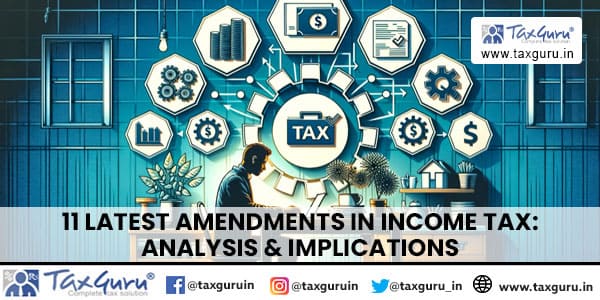Introduction: The landscape of income tax laws is constantly evolving, with amendments and updates reshaping the regulatory framework. In this article, we delve into eleven of the latest amendments in income tax, analyzing their implications and providing a comprehensive understanding for taxpayers and professionals alike.
1. Extinguish of demand
The CBDT has issued order that tax demands under Income Tax Act, Wealth Tax, and Gift Tax which are outstanding as on 31st March pertaining to assessment year 2010-11- each demand entry up to Rs.25000/- and assessment year 2011-12 to 2015-16 – each demand entry up to Rs. 10000/- shall be extinguished but subject to maximum ceiling of Rs. 1 lakh for any specific taxpayer/assesse. There are some additional points necessary to consider which are as follows-:
> If the demand is against the tax deductors or collectors under the TDS or TCS provisions of the Income Tax Act, 1961 then demand shall not be extinguished.
> Interest on account of delayed payment not to be considered for calculating the demand entry amount or the ceiling limit of Rs. 25,000, Rs. 10,000, or Rs. 1,00,000, respectively.
> Waiver of demand won’t impact ongoing or completed criminal proceedings against the assessee and doesn’t provide any benefit, concession, or immunity under such proceedings.
> The outstanding demand comprises the tax principal under the Income tax Act plus interest, penalty, fees, cess, or surcharge as per Act provisions, with the ceiling limit as applicable.’
2. Processing of Returns for A.Y 2021-22
The CBDT has issued order that all returns of income validly filed electronically for A.Y 2021-22 with refund claims and not processed can be processed under section 143(1) of Income Tax Act, 1961 up to 30th June April, 2024.

3. Amendment in Form 3CD and other forms
The CBDT has issued notification and amended Income Tax Rules, 1962. In form 3CD, clause 8a, 12, 18, 19, 26, and 32 has been amended, The Form no. 3CEB and Form 65 also amended. In clause 22 (E) after the figures “2006” , the words and figured “or any other amount not allowable under clause (h) of section 43B of the Income Tax Act , 1961 shall be inserted.
4. Exemption to Trust/Institution
The CBDT has issued circular that in order to ensure intended application towards charitable or religion purpose , Finance Act, 2023 has provided that eligible donation made by a trust/institution shall be treated as application for charitable or religion purposes only to the extent of 85% of such donations. Representation have been received raising the concern that whether the balance 15% of donation to other trust / institution would be taxable or is eligible since the funds would not be available having been already disbursed. The matter has been examined with reference to the issues raised and it is reiterated that eligible donations made by trust/ institution to another trust/institution under any of the two regime referred shall be treated as application for charitable or religious purpose only to the extent of 85% of such donations. It means that when a trust / institutions in either regime ,donates Rs. 100 to another trust/ institution in either regime , it will be considered to have applied 85% for the purpose of charitable or religion activity. It is clarified that 15% (Rs 15) of such donation by the donor trust / institutions shall not be required to be invested in specified modes under section 11 (5) of the Act as the entire amount of Rs 100 has been donated to the other trust/institution and is accordingly eligible for exemption under the first or second regime.
5. Proceedings u/s 147 of Income tax Act
The CBDT has issued order that based on value at risk, certain high risk cases have been identified for reopening under section 147 of the Act, These cases are made available to the assessing officer under clause (iv) of Explanation 1 of section 148 i.e. any information made available to the Assessing Officer under the scheme notified under section 135A. In view of the clause (d) to the Proviso of the section 148A of the Act, the Assessing officer is not required to issue notice under section 148A. In these cases the respective Assessing officer are advised to invoke provisions of section 147 of the Act and issue notice u/s 148 of the Act accordingly in such e-verification cases. The Assessing officer may proceed to get the approval of the specified authority for issuing notice u/s 148 in such cases as per 1st proviso to section 148 of the Income Tax Act, 1961
6. Income Tax Offices
The CBDT has issued order that all the Income Tax Offices throughout India shall remain open on 29th, 30th and 31st March.
7. Form 7 & ITR V for A.Y 2024-25
The CBDT has issued notification and notified ITR – 7 and ITR V for the A.Y 2024-25. ITR -7 is required to file when person including company are required to file return as per section 139(4A), 139(4B), 139(4C) and 139(4D).
8. No deduction of TDS on payment receivable by unit of IFSC
The CBDT has issued a notification exempting specific payments made to IFSC Units from Tax Deducted at Source (TDS) under the Income Tax Act, 1961. This exemption applies for ten consecutive assessment years starting from April 1, 2024.
9. Filing of appeal by Department
The CBDT has Circular that monetary limits given in circular with regards to filing appeal/SLP shall be applicable to all cases including those relating to TDS/TCS under the Act with the following exceptions where the decision to appeal/file SLP shall be taken on merits, without regard to the tax effect and the monetary limits. Exceptions are outlined, including cases involving constitutional validity, illegal orders, prosecution, adverse comments, and more. Notably, appeals concerning TDS/TCS, undisclosed foreign income/assets, tax evasion, and specific directions from courts or matters beyond income tax are addressed separately.
10. Modified ITR for Business Reorganizations
The CBDT has allowed successor companies to file modified ITRs in cases where the order of business reorganization of the competent authority was issued after 01.06.2016 but before 01.04.2022. The deadline to file modified ITR is 30.06.2024.This step is taken by board on consideration of difficulties being faced by such entities and to mitigate their genuine hardship.
11. E-Verification Scheme – 2021
The CBDT has issued Press Release that the Income Tax Department has identified certain mismatches between the information received from third parties on interest and dividend income, and the Income Tax Return (ITR) filed by taxpayers. In many cases, taxpayers have not even filed their ITR. In order to reconcile the mismatch, an on-screen functionality has been made available in the Compliance portal of the e-filing website for taxpayers to provide their response. At present, the information mismatches relating to Financial Years 2021-22 and 2022-23 have been displayed on the Compliance portal. The taxpayers are also being made aware of the mismatch through SMS and emails as per details available with the Department.
Conclusion: The latest amendments in income tax underscore the dynamic nature of tax legislation and its profound impact on taxpayers, businesses, and the economy at large. By staying abreast of these changes and understanding their implications, taxpayers can navigate the tax landscape effectively, ensuring compliance while optimizing tax planning strategies for sustainable growth.





can gains in ELSS investments by NRI be treated like equity MF and charged TDS of 10%? Is it correct to treat these gains as income from other sources and charged TDS of 30%
very good information. thank you